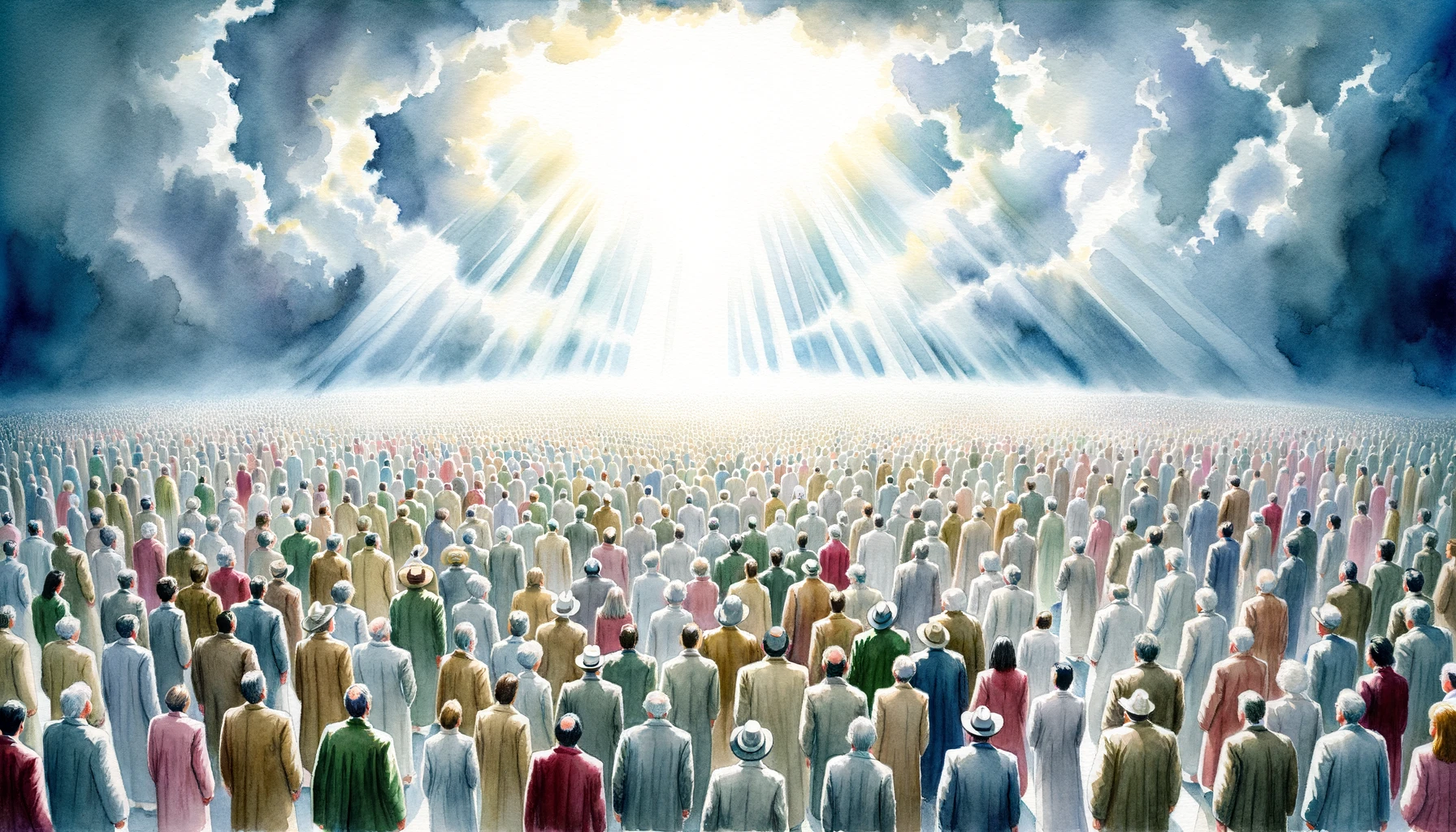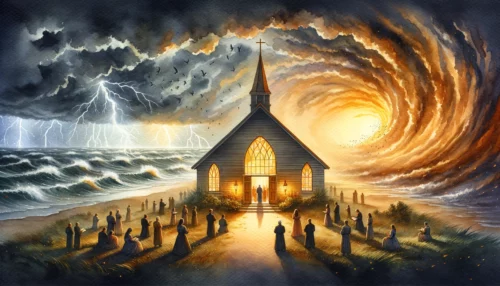In the book of Revelation, the apostle John presents a narrative filled with complex symbolism and prophetic insights, among them the mysterious group referred to as the 144,000. These individuals, drawn from all the tribes of Israel, are sealed for protection in the tumultuous times described in the apocalyptic text. But who are these 144,000? Are they a literal group of people or a symbolic representation of a larger truth? To better understand this, let’s explore the biblical narrative, historical context, and theological interpretations.
The 144,000 in the Book of Revelation
Revelation, the final book of the New Testament, stands out for its apocalyptic visions as seen by the apostle John. One of these visions includes the mention of a group of 144,000 individuals. This group is special for they are sealed by God for protection during the difficult times described in the prophecies.
John mentions the 144,000 in two distinct passages. The first mention comes in Revelation chapter 7. Here, the 144,000 are described as being chosen from the twelve tribes of Israel, with 12,000 from each tribe. The sealing signifies God’s protection over these individuals during the time of calamities that follow in the text. The seal is understood as a mark of God’s ownership and protection.
The second mention of the 144,000 appears in Revelation chapter 14. In this chapter, they are depicted standing with Jesus, the Lamb, on Mount Zion, which symbolises the place of God’s presence. They are said to be the ones who had kept themselves pure, abstaining from immoral acts, and they are described as being blameless.
An interesting detail is the song they sing, a song no one else could learn. This suggests a unique relationship and experience with God that is reserved for them alone. They are also described as ‘firstfruits’ to God and the Lamb. In biblical times, firstfruits were the best and first part of the crop that was offered to God. Therefore, this term implies the special and consecrated status of the 144,000.
The 144,000 are referred to in the book of Revelation as a group chosen and sealed by God for protection during challenging times. They are said to come from the twelve tribes of Israel, symbolising a comprehensive representation of God’s people. With a unique role and relationship with God, they stand with Jesus on Mount Zion, maintaining purity and blamelessness. They are also characterized as ‘firstfruits’, indicating their special status in God’s plan.
Historical and Theological Context of the 144,000
Understanding the number 144,000 from the book of Revelation requires grasping the historical and theological context of the times when it was written. John, the author of Revelation, was living during a period of intense persecution against Christians. This context may have influenced the symbolic language used in his prophecies.
The number 144,000, for instance, seems to be highly symbolic. It’s a multiplication of 12, a number that holds great significance in the Bible. There were 12 tribes in Israel and 12 apostles of Jesus, symbolising the completeness of God’s people in both the Old and New Testaments.
The mention of 144,000 individuals from the twelve tribes of Israel may point to the completeness of God’s people who remain faithful during times of tribulation. Considering the number from each tribe is equal – 12,000, it indicates an equal representation from each tribe, emphasizing the fairness of God.
Another layer of context comes from the concept of sealing. In the ancient world, a seal indicated ownership and protection. For example, a sealed letter or document belonged to the person whose seal was on it, and it was unlawful to break the seal. The sealing of the 144,000 by God thus signifies their belonging to Him and His protection over them.
The concept of ‘firstfruits’ has roots in the Old Testament. The Israelites were commanded to bring the first yield of their crops to God as an offering. This was a way to acknowledge that all good things come from God. The 144,000 being referred to as ‘firstfruits’ underscores their consecration to God.
The historical and theological context offers valuable insights into the significance of the 144,000 in the book of Revelation. The number itself seems to symbolise the totality of God’s faithful people, drawn from each of the twelve tribes of Israel. The practice of sealing in ancient times elucidates the concept of God’s ownership and protection of the 144,000. The reference to ‘firstfruits’ links back to Old Testament practices, highlighting the dedication and special status of the 144,000 before God.
Literal or Symbolic: The Interpretations of the 144,000
Turning to the question of whether the 144,000 is a literal or symbolic number, it’s clear that different interpretations exist within the Christian faith. The nature of Revelation as a highly symbolic book gives room for these different perspectives.
Some view the number literally, believing that 144,000 individuals, specifically from the Jewish lineage, will be sealed for protection during the end times (Revelation 7:4). This view typically aligns with those who interpret biblical prophecy in a more literal manner.
On the other side, many interpret the number symbolically, suggesting that it represents the totality of God’s people, both Jew and Gentile, who are faithful to Him. This perspective takes into account the symbolic nature of the book of Revelation and the use of numbers in biblical texts. As mentioned earlier, the number 12 is often used symbolically in the Bible to represent completeness or perfection. As such, the 144,000, being a multiple of 12, is seen by these interpreters as a symbolic number representing all of God’s faithful people.
There’s also an interpretation that the 144,000 refers to an ‘end times’ remnant of believers who will remain faithful during a period of great tribulation. These believers, it is thought, will have a special role to play in witnessing to God’s truth and grace.
The number 144,000 in the book of Revelation has been interpreted in various ways within the Christian faith. Some interpret the number literally, implying that exactly 144,000 individuals of Jewish lineage will be sealed. Others see the number as symbolic, representing the complete number of God’s faithful people, regardless of their ethnic background. Yet another perspective considers the 144,000 to be a future group of believers who remain faithful during times of great tribulation. Despite differing interpretations, all agree that the 144,000 hold a special place in God’s prophetic plan.
Unveiling God’s Mysterious Plan
The 144,000 of Revelation is an intriguing aspect of biblical prophecy, generating various interpretations within Christian faith. Regardless of whether we view the number as literal or symbolic, the message remains the same: God has a chosen people, protected and marked for a unique purpose. This underscores the faithfulness of God towards His people and the role of faith in enduring times of trial and tribulation.
- How does the symbolic interpretation of the 144,000 influence your understanding of God’s complete and diverse family?
- In what ways does the notion of being ‘sealed’ by God resonate with your personal faith journey?
- How can the story of the 144,000 inspire us to remain steadfast in our faith during challenging times?
As we walk in faith, let the story of the 144,000 remind us that our God is a God of promises. He marks, protects, and cherishes His people, promising to be with us in times of trials and tribulations. Let this promise inspire us, fuel our faith, and direct our hearts towards His eternal love and truth.














